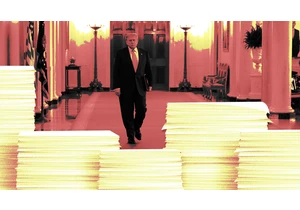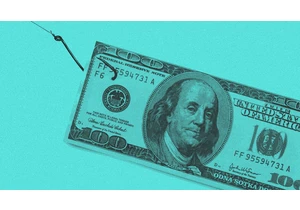Over the past couple of weeks, Tesla shareholders have been casting their ballots in one of the odder shareholder votes in corporate history: a vote to reinstate a massive $56 billion compensation package (the biggest in history) for Elon Musk that was put in place back in 2018 but was then thrown out by a Delaware judge in January. What makes the vote—the results of which will be finalized at Tesla’s annual meeting in June—so unusual is that it’s effectively asking shareholders to pay Musk many billions of dollars in stock options for work that has already been done.
Outlandish pay for a CEO is nothing new, of course. But CEOs typically get paid not for what they’ve done, but for what companies hope they will do: The pay is an incentive for good performance in the future, not a reward for past accomplishments. (That’s how Elon Musk’s 2018 package was designed: He would get paid in stock options based on hitting certain performance targets in the future.) But in this case, shareholders are being asked to give Musk stock options worth roughly 10% of the company, without him having to do anything more to earn them.
From a purely rational point of view, this would seem to make little sense. Even if you think Musk deserves something for the work he did over the past six years, Tesla’s board of directors had no obligation to offer him the original deal. (A judge, remember, ruled it was unfair to shareholders because it was not negotiated in an arm’s-length manner.) The board could have taken the opportunity to negotiate a new compensation arrangement that would be less costly to shareholders. It just didn’t.
So if reinstating the package isn’t economically rational, what are the arguments people are making for doing so?
The Incredible Hulk argument
The first is what you might call the ">“you wouldn’t like Elon Musk when he’s angry” argument. If shareholders refuse to pay Musk what he feels he’s owed, he’ll take his ball and go home, quitting as Tesla’s CEO and putting all his efforts into his other businesses. That’ll tank the stock and everyone will end up worse off.
This argument assumes Musk would be willing to cut off his nose to spite his face, since he still owns 13% of the company and has a strong financial incentive to ensure that it continues to do well. It also rests on the assumption that if Musk walked away, Tesla would be doomed. Both of those assumptions are speculative—but there is an economic logic to them.
The fairness argument
The more interesting argument being made for reinstating the package, though, has nothing to do with economics. Instead, it has to do with justice, namely that Tesla should pay Musk what it promised him because that’s the fair thing to do. And it isn’t just Musk fanboys on X who are saying this—this is the argument that Tesla’s board of directors is making to explain its recommendation that shareholders approve the package. In a message to shareholders last month, Robyn Denholm, the chairman of Tesla’s board, said that it would be “fundamentally unfair” for Tesla not to live up to the terms of the original deal.
In one sense, this isn’t surprising: Most people care about fairness, and want to think of themselves as acting in a fair and just manner. But given the context, it’s actually quite striking, since fairness arguments don’t usually have much purchase in corporate America, or among shareholders. Companies tell employees that they’re paid based on the market rate or on the value they’ll create. Meanwhile, many boards and CEOs don’t seem to think it’s unfair for a company leader to take home hundreds or thousands of times what the average employee makes.
In this case, though, Tesla’s board of directors says it’s concerned about fairness: It’s saying that even though it could potentially pay Musk less, it shouldn’t, because it would be wrong to do so. And it’s saying this even though Tesla’s most recent earnings report was dismal, the stock is down more than 20% on the year (taking its market cap below one of the original targets that Musk had to meet to get the whole package of options), and Musk has made it clear he’s going to need another lucrative pay package going forward.
Not everyone buys the fairness argument—Tesla’s largest retail investor, for instance, has said he’ll vote against the package. But even a cursory perusal of social media makes it clear that this argument has a great deal of pull with many Tesla shareholders. And while this speaks to the way ideas about fairness shape economic decisions, it’s also illustrative of the way in which many Tesla shareholders have invested in the company not just because they think they’ll make money, but because of their faith and devotion to Musk. For them, Elon Musk is a visionary genius who, in the words of one shareholder, “worked excruciatingly hard and deserves to get paid for making Tesla the company we all know and love today.”
Those aren’t the words of a cold-hearted capitalist, but of a true believer. And what makes this shareholder vote so fascinating is that it’s a kind of test of which shareholder attitude will win out: the cold-hearted, rational one (which would say reject the package, and have the board negotiate a more shareholder-friendly one), or the more soft-hearted one. We’ll find out in June.
Ak chcete pridať komentár, prihláste sa
Ostatné príspevky v tejto skupine

Before generative AI, if you wanted an inexpensive way to build out lo

Banks are embracing the AI workforce—but some institutions are taking un

For those who’ve had enough of scrolling AI slop, meet Picastro: an In

The Republican Party’s 800-page One Big Beautiful Bill Act is now being debated i

Colombian gangs are using social media to reach and recruit children, the United Nations has warned.
Gangs and rebel groups are enticing children to enlist by posting videos on platforms


